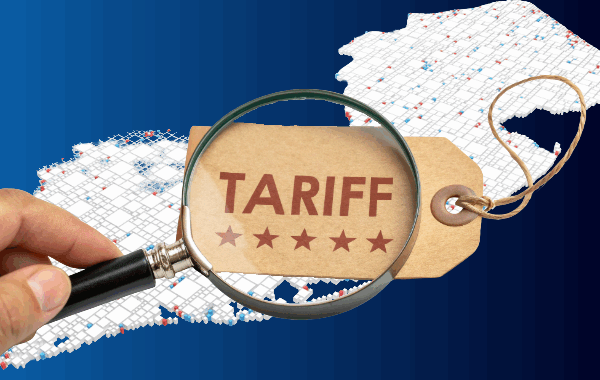New Jersey manufacturers and businesses that export products abroad are bracing for some “short-term pain for long-term gain” now that President Donald Trump has levied new tariffs on Canada, Mexico and China and these nations have responded with retaliatory tariffs on products made in the U.S., NJBIA President & CEO Michele Siekerka said.
In live interviews with NJ Spotlight News and NJ101.5 radio, Siekerka said the reaction she’s heard from New Jersey businesses has been a “mixed bag.”
“The cost of goods is going to go up for us, and in turn, there could be a price hike for our consumers,” Siekerka told NJ Spotlight News Anchor Briana Vannozzi on Tuesday night’s broadcast. “That is absolutely the concern, you know, at the front end.
“But I will tell you that we also have companies here and manufacturers as well that are saying, you know what? This may be some short-term pain for some long-term gain,” Siekerka said, noting the tariffs are expected to produce more investment in domestic manufacturing.
“I think what's going to be important in the long term is our ability to balance what might be the impact of this on the negative side with, for example, incentives, to come back and grow here in our country and in the State of New Jersey,” Siekerka said.
Important countermeasures to the new tariffs would be extending the federal tax cuts provided in the 2017 Tax Cuts and Jobs Act, which are set to expire at the end of this year, Siekerka said. Regulatory reforms that reduce the cost of doing business are also important, as are initiatives that reduce energy costs, which will all offset the impact of the tariffs, she said.
“I think in the short term it's a shock to the system. No doubt about it,” Siekerka said in a live on-air discussion with NJ101.5 radio’s Eric Scott on Wednesday morning. “But what do we need to do? We have to counterbalance that.
"We need to maintain tax relief for those that are affected. We need regulatory reform because of the cost of regulation. We hear the Trump administration also talking about the impact of energy and the cost of energy – and so if we can bring down the cost of energy here, we can offset.”
In the short-term, however, New Jersey manufacturers that need to import components that are not available in the U.S. will have to pay more for them with the Trump tariffs in place.
“Companies who think or see that they have a capital expenditure coming in the short term that requires them to source a product from overseas, a new piece of equipment that we don't make here, start getting your paperwork together for an exclusion or exemption,” Siekerka said on NJ101.5.
“There are no across the board exclusions from these tariffs. But you can go in independently, and you can make your case to get your exclusion...,” Siekerka said, referring to the formal appeal process managed by the Office of the U.S. Trade Representative’s Office.
NJBIA “will walk people to where they need to be walked to, and we'll connect them with the people they need to talk to. We'll work with our federal delegation to help our members and our businesses in New Jersey any way we can,” she said.
The tariff situation remains fluid. On Wednesday afternoon, a day after the tariffs against Canada and Mexico were announced, the White House announced a temporary carveout, giving automakers a one-month reprieve from paying tariffs on cars imported from Canada and Mexico.
“We spoke with the big three auto dealers. We are going to give a one-month exemption on any autos coming through USMCA,” said Karoline Leavitt, White House press secretary, referring to the 2018 United States-Mexico-Canada Agreement.




